Understanding the Power of Humor in Caregiving
Caregiving, especially for individuals with chronic conditions such as dementia or Alzheimer's, often comes with intense emotional, physical, and mental challenges. While stress, burnout, and emotional exhaustion are common, incorporating humor and laughter offers a powerful, scientifically backed way to foster resilience, improve well-being, and strengthen relationships. This article explores the multifaceted role of humor in reducing caregiver stress, supported by research, practical strategies, and therapeutic insights.
Benefits of Humor and Laughter for Caregivers

What are the benefits of humor and laughter for caregivers?
Humor and laughter serve as powerful tools in caregiving settings, offering a multitude of advantages that can significantly improve both mental and physical health outcomes for caregivers. Engaging in humor not only reduces stress but also acts as a preventive measure against burnout, helping caregivers sustain their capacity to provide compassionate care over the long term.
One of the most immediate benefits is emotional resilience. Laughter triggers the release of endorphins, natural painkillers, and mood enhancers, which can ease feelings of anxiety, depression, and emotional exhaustion. It provides a mental escape and fosters a positive outlook, essential for dealing with the often challenging realities of caregiving.
Physically, humor and laughter boost immune function by increasing production of infection-fighting antibodies and stimulating the cardiovascular system. Laughing lowers cortisol levels, the body's primary stress hormone, leading to reduced blood pressure and heart rate, and enhances circulation. These physiological effects help caregivers better manage the physical toll of their responsibilities.
Strengthening relationships is another significant payoff. Shared moments of humor create bonds, foster trust, and improve communication between caregivers and their loved ones. This is especially vital when caring for individuals with dementia, where humor can reduce agitation and create a sense of normalcy.
Furthermore, humor promotes a positive mental state, which can improve caregivers' overall outlook on life. Maintaining a sense of humor helps reframe stressors as manageable, buffer emotional strain, and sustain motivation. Resources like sharing funny stories or watching comedic content in support groups can facilitate this process.
Overall, incorporating humor and laughter into caregiving routines supports psychological well-being and physical health, making caregiving a more sustainable and fulfilling experience for caregivers.
Incorporating Humor into Caregiving Routines
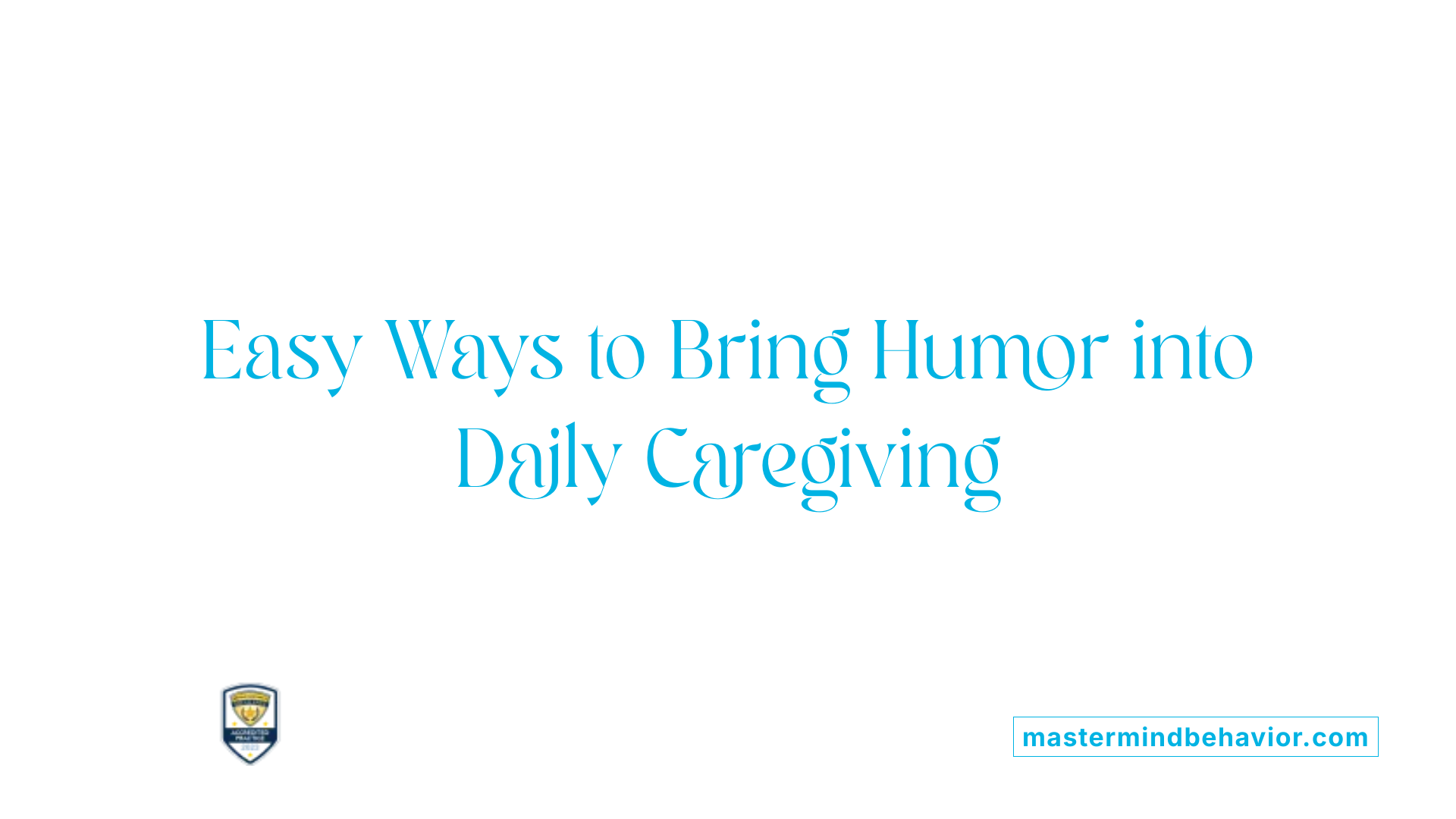 Caregivers can effectively weave humor into their daily routines to foster joy, reduce stress, and strengthen their bond with care recipients. One approach involves sharing humorous stories—tales that evoke laughter without trivializing the experience of caregiving. These stories can be personal anecdotes or funny memories that bring levity to challenging moments.
Caregivers can effectively weave humor into their daily routines to foster joy, reduce stress, and strengthen their bond with care recipients. One approach involves sharing humorous stories—tales that evoke laughter without trivializing the experience of caregiving. These stories can be personal anecdotes or funny memories that bring levity to challenging moments.
Entertainment activities such as watching comedy shows, sitcoms, or funny videos serve as accessible sources of humor. Engaging in humorous games or participating in laughter yoga can also encourage spontaneous laughter and physical well-being.
Consuming humorous content, like jokes or cartoons, can lift mood and create a shared experience. Caregivers are encouraged to incorporate playful interactions like making funny faces, dancing lightly, or decorating spaces with cheerful, colorful items. These simple acts can lighten the atmosphere and bring smiles.
Sensitivity and appropriateness are vital considerations. Humor should always be inclusive, respectful, and tailored to the individual’s emotional and cognitive state. For example, in dementia care, exaggerated or visual humor often works best, avoiding anything that might cause discomfort or confusion.
By intentionally adding humor through these activities, caregivers not only ease their own stress but also create supportive, positive environments. This approach helps maintain emotional resilience, prevents burnout, and nurtures a trusting relationship with those in their care.
Scientific Evidence for Humor as a Stress-Relief Strategy
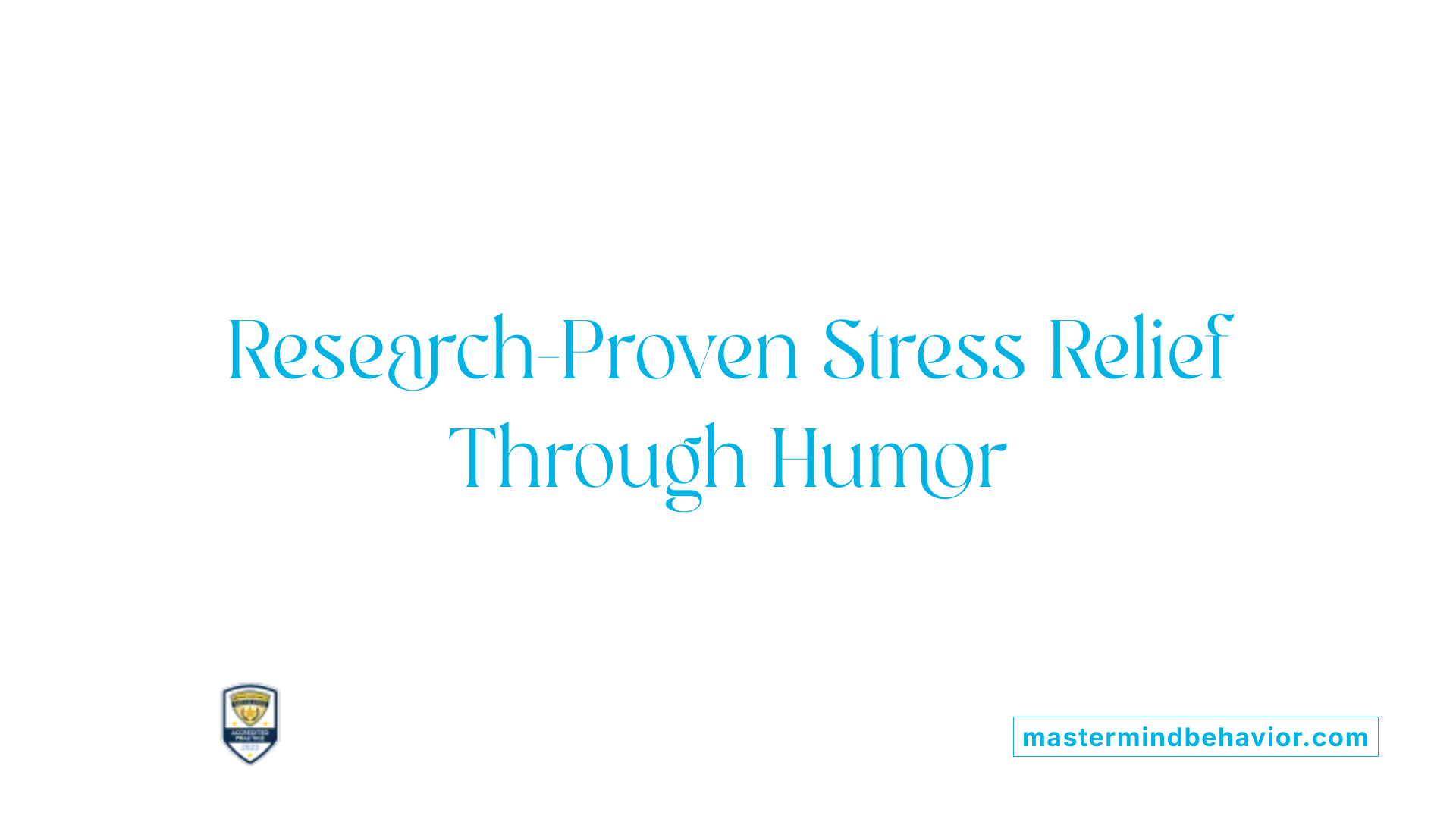
What scientific evidence supports humor as a stress-relief strategy for caregivers?
Research consistently demonstrates that humor and laughter have significant physiological and psychological benefits that make them effective tools for stress management among caregivers. When people laugh, their bodies respond by activating various biological processes that promote relaxation and enhance health.
Physiologically, laughter increases oxygen intake, stimulates the heart, lungs, and muscles, and improves circulation. These effects mimic those of light exercise, which helps lower blood pressure and heart rate, reducing physical stress symptoms. Laughter also releases endorphins—natural painkillers and mood enhancers—while decreasing stress hormones like cortisol. A study from the University of Kansas found that smiling during stressful activities led to faster heart rate recovery, highlighting laughter’s immediate calming effects.
Psychologically, humor improves mood, fosters positive emotions, and can reduce feelings of anxiety and depression. Caregivers who incorporate humor find it easier to cope with the emotional weight of their responsibilities, leading to increased resilience. Humor-based interventions, such as laughter therapy, have shown to enhance mental well-being and cognitive function, reducing burnout and emotional exhaustion.
Further, humor appears to boost the immune system. Studies show that laughter increases the production of immune-enhancing neuropeptides and immunoglobulins, which help fight infections and improve immune defenses. For example, laughter raises serum immunoglobulins and activates natural killer cells, crucial components of immune response.
Research also highlights the role of humor interventions in reducing stress hormones over time. A study involving nurses and caregivers revealed that a structured humor session helped maintain their sense of humor and decreased perceived stress levels over a six-month period. This evidence supports the idea that humor is not only beneficial in the short term but also has lasting effects on reducing stress-related health risks.
In summary, scientific investigations confirm that humor and laughter are powerful, accessible tools to mitigate stress, support emotional well-being, and bolster immune function in caregivers. Their integration into daily routines or support programs can significantly improve caregivers’ quality of life and resilience against chronic stress.
Humor in Caregiver Relationships and Emotional Connection

What role does humor play in caregiver relationships and connections with care recipients?
Humor significantly enhances the bonds between caregivers and those they care for by creating a sense of emotional closeness and trust. When caregivers share a laugh or engage in lighthearted play, they humanize the caregiving experience, transforming routine or stressful moments into opportunities for joy and bonding.
Shared humor can soften the difficulties of caregiving, making challenging tasks easier and fostering resilience. It acts as a release valve for emotional tension, helping both caregivers and care recipients feel more comfortable and understood.
Incorporating humor into caregiving not only improves mental health and reduces burnout but also promotes a sense of normalcy and connection. It encourages open, genuine communication, which is critical when coping with the emotional demands of caregiving.
However, it's essential to use humor sensitively. Respecting individual boundaries and avoiding humor that could be offensive or hurtful ensures that laughter remains a positive force without violating trust or dignity.
Building trust, enhancing communication, and creating moments of joy
Using humor thoughtfully can build a foundation of trust. When caregivers respond with warmth and a sense of humor, they show empathy and understanding, making care recipients feel valued and respected.
Humor also improves communication, especially in situations where words may be insufficient or difficult. For example, sharing a funny memory or joking about a common experience can ease misunderstandings and foster mutual understanding.
Creating moments of joy through humor lifts spirits, minimizes feelings of loneliness, and encourages positive interactions. These shared experiences can be powerful in making caregiving a more meaningful and less burdensome task.
Reducing tension and fostering mutual understanding
Humor acts as a natural tension diffuser. In stressful moments—such as medical routines or confronting memory loss—a well-timed joke or humorous comment can break the ice and reduce anxiety.
It helps establish a more relaxed environment where both caregiver and care recipient feel safe and supported. This atmosphere of levity fosters mutual understanding and patience, essential ingredients for a harmonious caregiving relationship.
In conclusion, humor is a vital tool for strengthening relationships in caregiving. When used appropriately, it builds trust, improves communication, creates joy, eases tension, and deepens mutual understanding—ultimately contributing to healthier, more resilient caregiver and care recipient connections.
The Impact of Humor on Caregivers’ Mental and Physical Health
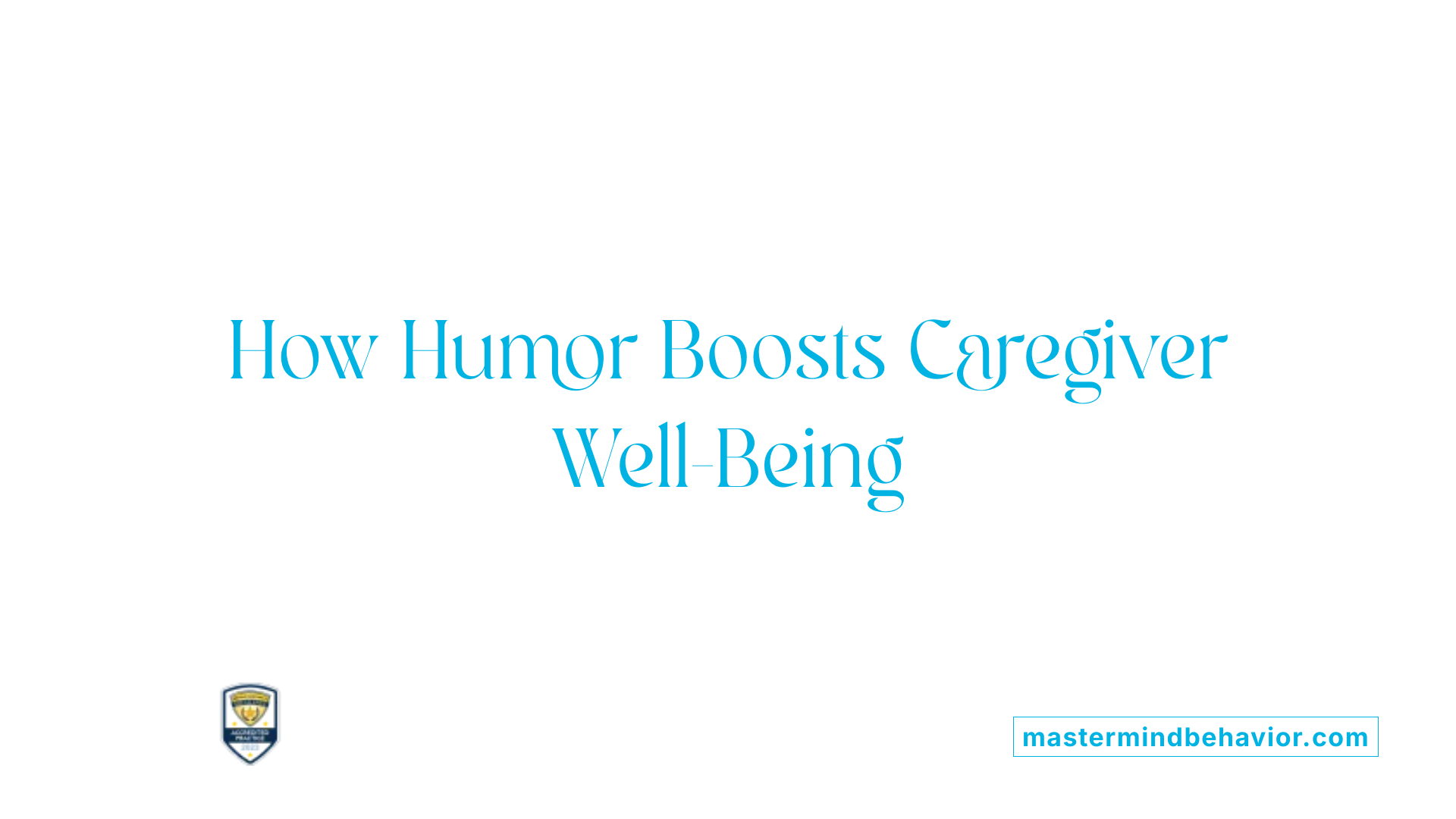
How does humor contribute to the mental and physical health of caregivers?
Humor is an invaluable tool for caregivers, offering both emotional and physiological benefits. It helps reduce stress and anxiety, which are common among those caring for loved ones with chronic conditions like dementia. The act of laughing releases endorphins, the body's natural feel-good chemicals, creating a positive mood and a sense of well-being.
On a mental level, humor can improve mood, foster resilience, and help caregivers maintain a sense of perspective during challenging times. Sharing humorous stories or engaging in funny activities like watching comedy movies or videos can lift spirits and strengthen emotional bonds. This often leads to decreased feelings of burnout and a more positive outlook.
Physiologically, laughter acts as a natural stress reliever. It reduces cortisol levels, the hormone associated with stress, and promotes better heart health by increasing blood flow and lowering blood pressure. Laughter also boosts the immune system by increasing the production of infection-fighting antibodies and activity of immune cells.
Research shows that humor enhances problem-solving skills, encourages creative thinking, and improves social interactions. Support groups and humor interventions have demonstrated lasting benefits, such as sustained positive affect over months and reduced perceptions of stress.
In sum, humor supports caregivers both emotionally and physically by alleviating stress, fostering happiness, strengthening immune response, and helping manage the physical symptoms of stress. Incorporating humor into daily routines can empower caregivers to sustain their health and effectiveness in their vital role.
Humor Therapy and Its Role in Supporting Caregivers' Well-Being
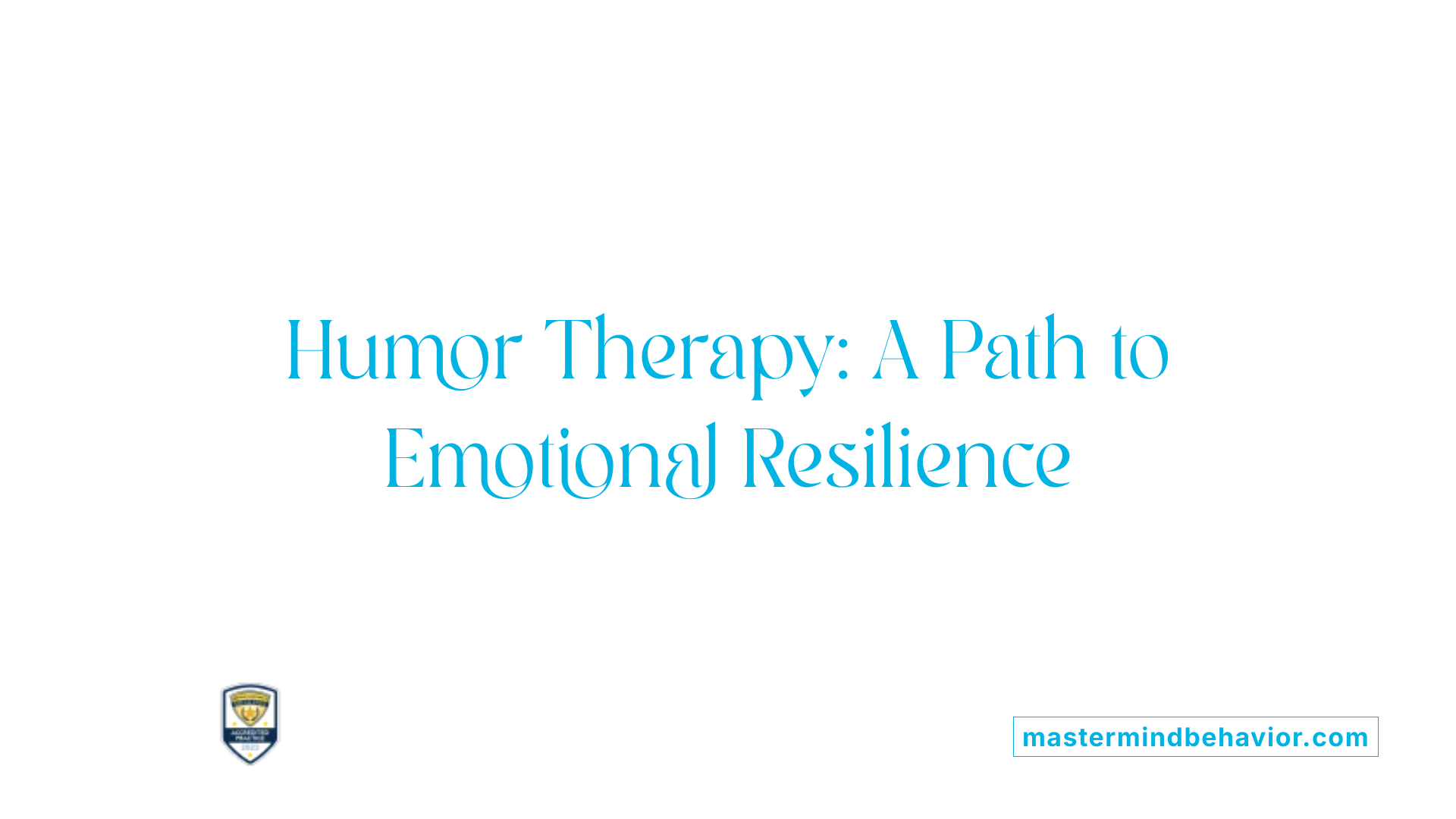
How can humor therapy support caregivers' mental health?
Humor therapy offers practical and emotional benefits for caregivers, significantly improving their mental health. Studies show that engaging in humorous activities, such as laughter yoga, watching funny videos, or sharing humorous stories, helps reduce stress, anxiety, and depressive symptoms. For example, humor interventions with nurses and caregivers have demonstrated that maintaining a sense of humor can sustain positive feelings and enhance overall emotional resilience over several months.
Activities like laughter yoga combine breathing exercises with simulated laughter, releasing endorphins that lift mood and reduce stress hormones like cortisol. Humor skill training, including learning to recognize and create humor in everyday moments, can strengthen caregivers’ ability to cope with challenges, fostering a more positive outlook even during tough times.
Support programs and community groups often incorporate humor-based sessions, which facilitate social bonding and reduce feelings of isolation. These interactions encourage caregivers to find joy and levity amidst difficult routines, decreasing the risk of burnout and depression. Importantly, humor models adaptive styles like self-enhancing and affiliative humor, which are linked to better mental health outcomes, while avoiding maladaptive humor styles that can worsen emotional well-being.
In sum, humor therapy acts as a natural stress buster, boosts immune function, and equips caregivers with resilience strategies, making the caregiving journey more sustainable and emotionally fulfilling.
Special Considerations for Using Humor with Dementia Care Recipients
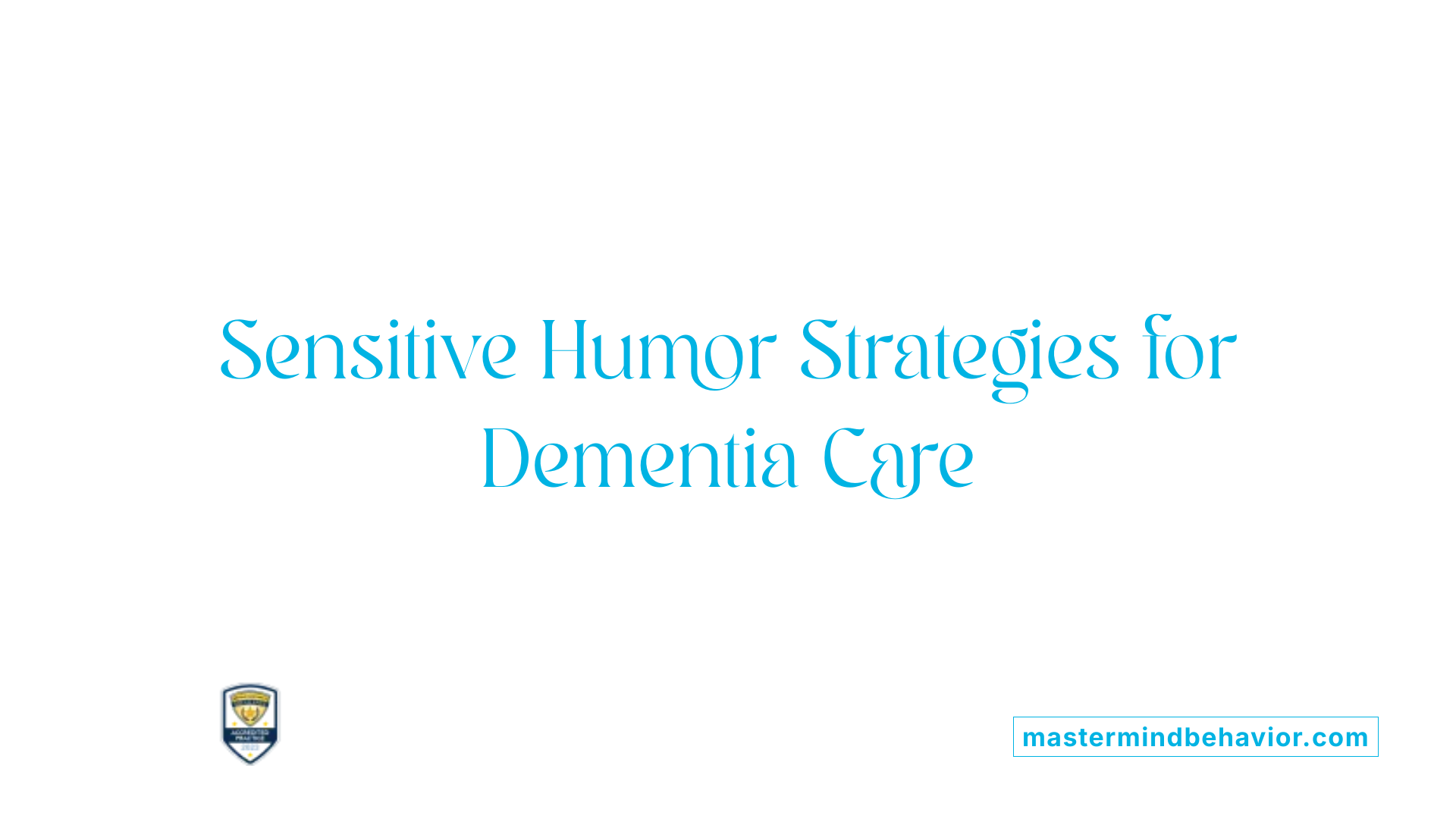
Are there specific considerations for using humor when caring for individuals with dementia or Alzheimer's?
Humor can be a powerful tool in dementia care, but it requires sensitivity and appropriateness to be truly beneficial. Caregivers should focus on humor that fosters positive interactions without causing confusion or distress. For example, using slapstick comedy, silly songs, or sharing funny videos that are easy to understand can brighten the mood and encourage social engagement.
It’s important to avoid maladaptive humor, such as sarcasm, ridicule, or humor that targets the person’s condition, as these can be harmful and deepen feelings of frustration or isolation. Instead, humor that embraces the person’s abilities and preferences helps promote emotional well-being.
Tailoring humor activities to the cognitive and emotional levels of individuals with dementia is essential. Activities like singing familiar songs, participating in clowning or comedy sessions designed for dementia patients, or sharing harmless funny stories can reduce agitation and improve overall mood. Creating a safe, respectful environment where humor enhances connection without risks is the goal.
Overall, incorporating humor thoughtfully can make caregiving more joyful and help maintain dignity, social bonds, and quality of life for those with memory impairments.
Embracing Humor for a Healthier, Happier Caregiving Experience
Incorporating humor and laughter into caregiving routines is a valuable, evidence-based strategy for reducing stress, strengthening relationships, and supporting overall well-being. By fostering a lighthearted outlook and using humor thoughtfully, caregivers can navigate the emotional and physical demands of their role more effectively. Resources like humor therapy, support groups, and playful activities provide accessible ways to integrate humor into daily life. Ultimately, a positive attitude infused with humor not only benefits the caregiver’s health but also enhances the quality of life for those receiving care, making caregiving a more sustainable and rewarding journey.
References
- Benefits of Finding Humor While Caregiving - Bridges® by EPOCH
- Care for Joy: Evaluation of a Humor Intervention and Its Effects on ...
- Keeping Your Sense of Humor as a Family Caregiver
- Stress relief from laughter? It's no joke - Mayo Clinic
- [PDF] Tips on the Value of Humor for Caregivers - North Woods Village
- Coping with caregiving: Humor styles and health outcomes among ...
- Laughter: The Right Prescription for Stressed Out Caregivers
- Humor and Stress Relief for Family Caregivers | In Home Care








